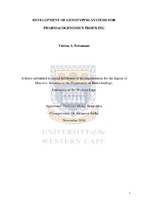Development of genotyping systems for pharmacogenomics profiling
Abstract
Genetic variability in genes encoding drug metabolizing enzymes, transporters and targets are known to be the main factors of inter-individual differences in therapeutic outcome. Genetic factors are estimated to be responsible for about 15-30% of inter-individual variation in drug disposition and response. Single-nucleotide polymorphisms (SNPs) are the most prevalent class of genetic variation that could explain the variability in drug efficacy and undesired side effects for patients. The aims of this study were to develop and evaluate the performance of robust and high throughput techniques for genotyping ten polymorphisms related to anticancer drugs and ten polymorphisms related to cholesterol lowering drugs. SNaPshot minisequencing and high resolution melt analysis (HRM) genotyping panels were developed, optimized, and their performances were evaluated and compared. SNaPshot minisequencing systems were developed and successfully optimized for the genotyping of ten SNPs associated with anticancer drug therapy, and ten SNPs associated with cholesterol lowering drugs. These systems were used to genotype the selected SNPs in 130 healthy Cape Admixed participants residing in Cape Town, South Africa. Population genetics data obtained for the studied SNPs were analysed using several statistical analysis software tools. Important population genetic parameters were calculated. Among others, allelic and genotypic frequencies were determined and compared with other populations in the world. High resolution melt analysis (HRM) genotyping panels were developed, optimized and their performance were evaluated and compared to the SNaPshot assays. HRM was explored as an alternative inexpensive and rapid methodology to genotype five SNPs related to anticancer therapy and five SNPs related to cholesterol lowering therapy (statins). Unlike the SNaPshot assays, rigorous optimization was required for the detection heterozygous genotypes via HRM. Both assays were validated using direct sequencing and compared to each other. The HRM system is a closed tube, cheap and (theoretically) rapid method for identifying genetic variations. HRM was however found to be more time consuming, needed further optimization, primer redesigning and more evaluation. The developed genotyping systems could be further validated using clinical samples from patients. This could help in optimizing drug therapy for cancer and cholesterol treatment.

